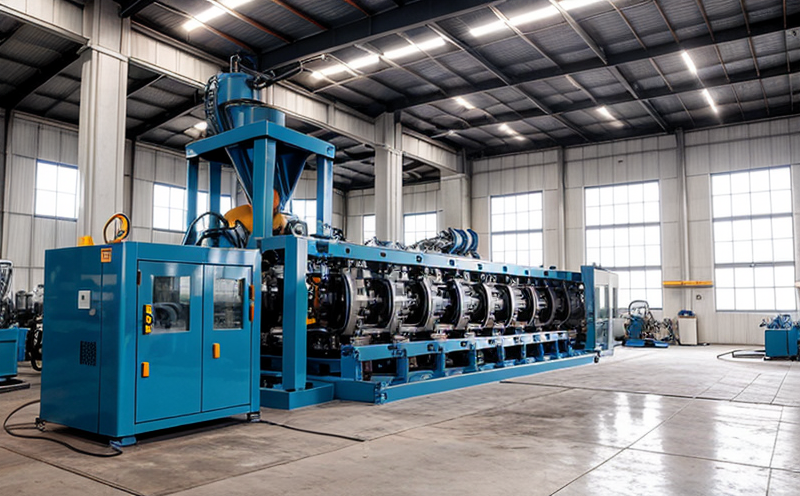ASTM D638 Tensile Performance Testing of Machinery Parts
The ASTM D638 standard specifies the procedure for tensile testing plastics and related materials. This service is particularly crucial in industrial manufacturing and processing, especially when evaluating the performance of machinery parts that are subjected to stretching forces during operation.
In the context of industrial machinery, components like belts, hoses, chains, and structural elements often encounter significant tensile stresses. Ensuring these parts meet or exceed the required strength standards is paramount for safety, reliability, and operational efficiency. ASTM D638 provides a standardized approach to measure how materials perform under tension, allowing manufacturers to validate their products against international benchmarks.
The testing procedure involves subjecting specimens cut from the machinery part to controlled stretching until they fail. The machine operator carefully measures the force required for this failure and records the elongation at various points during the test. This data is then analyzed according to ASTM D638 criteria, which dictate acceptable ranges based on material type and thickness.
For instance, a manufacturer of conveyor belts might use ASTM D638 testing to ensure that their belt will withstand the high loads encountered in industrial environments without breaking down. Similarly, automotive manufacturers rely on this test for components like fuel lines or brake hoses that must endure substantial tensile stress during vehicle operation.
The precision and repeatability of ASTM D638 make it an indispensable tool in quality assurance programs. By using consistent methods and equipment, laboratories can provide reliable data that supports informed decision-making throughout the product lifecycle—from design to final assembly.
Understanding how materials behave under tension helps engineers optimize designs for better performance and durability. For example, if a test reveals that a particular belt material is not as strong as required by ASTM D638, manufacturers can explore alternative materials or adjust their manufacturing processes to improve the outcome.
In summary, ASTM D638 tensile testing plays a critical role in ensuring the quality and reliability of machinery parts. It provides a standardized method for measuring tensile strength that is widely accepted across industries, enhancing confidence in product performance and safety.
Why Choose This Test
- Comprehensive Compliance: Ensures your machinery parts meet international standards for tensile strength.
- Precision and Consistency: Uses ASTM D638 methodology to provide reliable and repeatable test results.
- Industry-Wide Acceptance: Widely recognized across manufacturing sectors, ensuring your products align with global quality benchmarks.
Quality and Reliability Assurance
- Data Accuracy: Rigorous ASTM D638 testing ensures accurate measurement of tensile strength, crucial for quality control.
- Consistent Results: The standardized process guarantees consistent outcomes, supporting reliable product performance and longevity.
International Acceptance and Recognition
The ASTM D638 standard is widely recognized globally for its accuracy and reliability in tensile testing. This broad acceptance means that results from this test are highly credible, making them valuable for international trade and compliance.
Many industries, including automotive, aerospace, and construction, rely on ASTM D638 to ensure the integrity of their materials. The standard's rigorous procedures and strict criteria have earned it a reputation as an authoritative source in material testing.
For manufacturers operating internationally or those seeking to expand into new markets, compliance with ASTM D638 is often a prerequisite for certification and approval. This not only streamlines the export process but also enhances brand credibility among customers who prioritize quality and safety.





